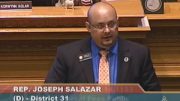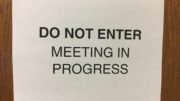By Jeffrey A. Roberts
CFOIC Executive Director
Gov. John Hickenlooper signed legislation Thursday that requires a “cooling-off period” when open-records disputes reach the point where litigation is being considered.
With House Bill 17-1177, someone who is denied records under the Colorado Open Records Act (CORA) must wait 14 days to challenge the denial in court. During that time, the records custodian for a government entity must speak with the requester in person or by phone in an attempt to resolve the matter.
Rep. Cole Wist, the Centennial Republican who sponsored the measure with Denver Democratic Rep. Alec Garnett, called it a “cooling-off period” during a House committee hearing in March. The required meeting “may last five minutes. It might last five hours,” he said. “The primary purpose here is to facilitate conversations.”
“Transparency without litigation,” Wist tweeted after the bill signing.
CORA reform advances. HB 1177 signed into law – transparency without litigation. @AlecGarnett #coleg #copolitics pic.twitter.com/votzNg3dtt
— Cole Wist (@colewist) May 4, 2017
The bill, however, also includes a significant opt-out clause, allowing a requester to explain in writing why he or she has “an expedited need” for the records. Under that provision, which might apply to a news reporter working on a deadline, CORA’s current three-day notice of intent to sue would be in effect.
It’s difficult to predict the impact of the legislation, which Wist proposed after serving on last year’s CORA Working Group, the stakeholders’ effort that produced a separate CORA modernization bill. CORA lawsuits aren’t common, and it’s assumed that most people who are denied public records give up rather than take on the expense and effort of going to court.
The Colorado Freedom of Information Coalition highlighted this problem in a report last summer, noting that filing a lawsuit is the only legal remedy for challenging a records denial in Colorado. CFOIC’s research found that at least 26 other states offer some sort of dispute-resolution process as an alternative to suing the government.
“There is a public benefit to letting people know that there are other ways to solve these problems, that they don’t have to go to court,” CFOIC President Steve Zansberg said of HB 17-1177. “I think it advances the ball a little bit.”
The bill that passed the legislature with no opposition is entirely different from the version that Wist and Garnett introduced early in the session. They completely rewrote the measure after hearing concerns from both requesters and government entities.
The required meeting in the revised bill may involve “any method of dispute resolution,” including the use of a professional mediator. But both parties must agree and share the cost.
Mediators charge an average of $75 an hour, according to Mike Maday of The Mediation Association of Colorado. He said mediation can be done in person or by phone, and it often takes about two hours to resolve a dispute.
Follow the Colorado Freedom of Information Coalition on Twitter @CoFOIC. Like CFOIC’s Facebook page. Do you appreciate the information and resources provided by CFOIC? Please consider making a tax-deductible donation.




